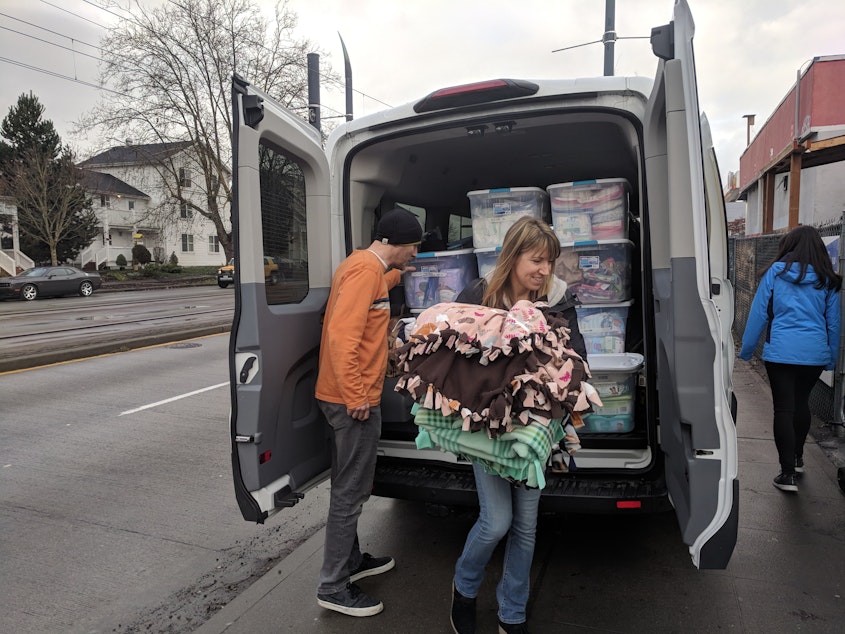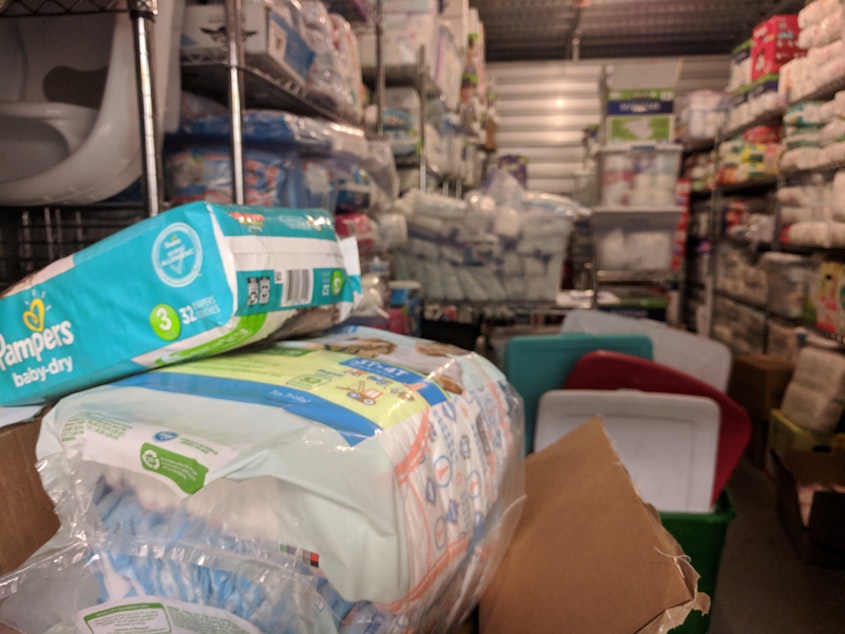Dry baby bottoms: That’s the mission for these Seattle organizations

On a chilly Sunday morning, Ashlee Francis stands outside the True Hope tiny house village in Seattle for people who are homeless.
In front of her is a van filled with tubs of baby wipes, blankets, formula, and diapers of various sizes.
Francis is pregnant, expecting to deliver in a matter of days.
She lives at the tiny house village and she and her partner are appreciative of the chance to stock up on diapers before the baby arrives.
“These guys being here helps us so that we can actually afford to not have to give up our baby,” Francis said.
“If it wasn't for programs like this we'd have to think of alternative means for our son until we'd be able to get up on our feet," she said.
Babies go through dozens of diapers a month. That can get expensive.
Sponsored
For low-income families, and families experiencing homelessness, it can be unaffordable. And for those who struggle with the essentials, there are gaps in the system.
Government assistance programs like food stamps and WIC don’t pay for those kinds of essentials for kids.
That means some families experience diaper need.
Several groups in the region are trying to fill that need. Babies of Homelessness is one of them.
The nonprofit group drives their van to shelters and tiny house villages like the one where Francis lives, delivering diapers and other necessities. They also deliver to individuals who may be living in vehicles or outside.
“The families that we serve are unsheltered or in a crisis situation,” said Angela Harmon, volunteer and vice chair for Babies of Homelessness.
She said they try to take the burden off families by going to them.
“If we’re taking that part of the equation out of it, it really takes a lot of stress off of them,” she said.
Sponsored

Sponsored
There are diaper banks in the region that will help families struggling to afford an adequate supply to keep their kids clean and dry.
But Harmon said there are only seven in Washington state, and none in some places like Snohomish County.
That can make things tough for families like Francis’.
Francis said she and her partner are saving up to get back into an apartment. They’re hopeful they’ll be in their own place before the New Year.
But they don’t have much of an income, and that means things like diapers can become a significant cost.
Sponsored
"A baby can go through up to twelve diapers per day when they're a newborn, and this can be a huge expense for families," said Sarah Cody Roth, interim executive director of Westside Baby, a diaper bank in West King County.
Westside Baby partners with more than 100 organizations to supply car seats, cribs, diapers and other necessities to low-income families.
Cody Roth said diapers can cost a family up to about $100 per month, per child.
Parents who don't have enough diapers might stretch the time between changes or may re-use dirty ones. That can cause stress and increase cases of diaper rash for babies.
Cody Roth said an inadequate supply of diapers can also mean parents miss school or work. Childcare providers often require families provide enough diapers for changes throughout the day.
Sponsored
"We also know that parents who are unable to access childcare because of diaper need missed school or work an average of four days per month,” Cody Roth said. “This is having a significant impact on the entire family and their ability to really keep stable employment."
Across the US, diaper need is high. Some groups estimate as many as one in three families with young children struggle to afford enough.
Last month, the Seattle City Council added more than $100,000 to the 2020 budget to address diaper need and provide diapers at shelters.
In the meantime, groups like Westside Baby and Babies of Homelessness continue to fill the gap. Last year, the two groups distributed nearly 1.3 million diapers.




